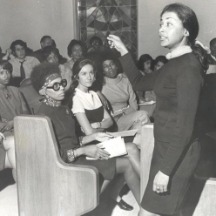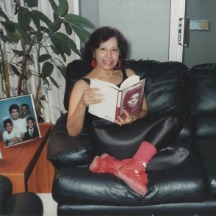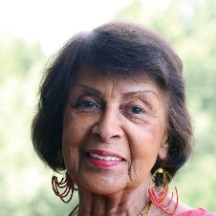Miriam was one of my mentors. She was a great personal supporter, supporter of Port Of Harlem magazine, and the Port of Harlem Gambian Education Partnership. Fittingly, her eldest child, Memphis Municipal Court Judge Tarik Sugarmon, told the Tri-State Defender.
"Mother loved mentoring young scholars and teaching young people. She relished every moment in academia."
Every outing we had together was always a joy and a passive learning experience. One of those experiences was having lunch with her at her very nice Washington, DC apartment. And, in the center of our very nice plates was a handful of food.
I was still in my 30s and wanted a plateful, and soda, not water. From that experience, I learned what she was doing in her life: eating primarily for fuel; not for pleasure. “I remember her youthful exuberance and her commitment to self-care,” added Patricia Bell-Scott, University of Georgia Professor Emerita and co-founding editor of SAGE: A Scholarly Journal on Black Women.
“I never thought that losing a girlfriend would be this difficult,” said Sandra Vaughn, retired vice president for academic affairs and professor of Political Science, who has experienced the loss of a husband and parents. “This relationship was different; we chose to be friends. We trusted each other, knew each other's families, and each other's skeletons.”
I barely recall the times Vaughn remembers we met in Washington. However, I firmly recall having breakfast with her and Miriam in Memphis, where DeCosta had moved, Vaughn was living, and we all have family ties. At the ordinary eatery, we had traditional southern haute cuisine including grits, eggs, and pork.
We each had a plateful as full as the nearby Mississippi River is wide. And, as she put half of her food into take-away cups, I looked at Miriam and said, “I didn’t think you were going to eat all of that!” She firmly said was a cute smirk, “No, I am taking half of this home.” Pointing at the meat, she continued, “But, I am going to eat all of this!”
I never really knew Miriam’s age until I read her obituary. Though she was slightly younger than my mother, she was never my “play mother.” “She did not make you feel like there had to be a vertical relationship because she was older or more accomplished or anything else,” recalls Morgan State University Archivist Ida Jones as we talked about our interactions with the editor of the 1992 groundbreaking Erotique Noire: Black Erotica: A Celebration Of Black Sensuality. “Miriam was as down to earth as she was brilliant,” chimed in former neighbor and travel partner, Grady Poulard.
Miriam DeCosta Willis (1934-2021)


In Port Of Harlem, we featured “The Many Pens of Miriam DeCosta Willis,” in our maiden issue in November 1995. Over the decades, we have covered the release of many of her books, which covered diverse subjects. Personally, her passion for Ida B. Wells rubbed my bones and my wallet after she penned The Memphis Diary of Ida B. Wells and I purchased a bust of our fellow Memphis Tri-Stater (Tennessee, Mississippi, and Arkansas) Ida B. Wells.
“Miriam loved to laugh and have good old-fashioned fun. She would regale her close friends with stories about her escapades into "forbidden" areas of Memphis where she enjoyed live music and dancing,” Lucie Fultz told Port Of Harlem.
Vaughn, who like many of her long-term friends also knew her as "Laurie," says after the pandemic there may be a celebration of her life in The Bluff City, Memphis. However, she is not sure if it will be in a “forbidden” place. There will be food there, but I will only eat in strict moderation, not just out of memory of Miriam, but that is what I do now.
Memphis Commercial Appeal Obituary
The History Makers: Miriam DeCosta-Willis
Miriam DeCosta-Willis (1934-2021) - Memphis Public Libraries
DeCosta-Willis Honored as First Black Faculty Member at then-Memphis State
Ida B. Wells Statue to Soon Watch Over Her Cherished Beale Street

“Miriam loved to laugh and have good old-fashioned fun. She would regale her close friends with stories about her escapades into "forbidden" areas of Memphis where she enjoyed live music and dancing,” Lucie Fultz told Port Of Harlem.
Vaughn, who like many of her long-term friends also knew her as "Laurie," says after the pandemic there may be a celebration of her life in The Bluff City, Memphis. However, she is not sure if it will be in a “forbidden” place. There will be food there, but I will only eat in strict moderation, not just out of memory of Miriam, but that is what I do now.
Memphis Commercial Appeal Obituary
The History Makers: Miriam DeCosta-Willis
Miriam DeCosta-Willis (1934-2021) - Memphis Public Libraries
DeCosta-Willis Honored as First Black Faculty Member at then-Memphis State
Ida B. Wells Statue to Soon Watch Over Her Cherished Beale Street
Advertisers | Contact Us | Events | Links | Media Kit | Our Company | Payments Pier
Press Room | Print Cover Stories Archives | Electronic Issues and Talk Radio Archives | Writer's Guidelines






